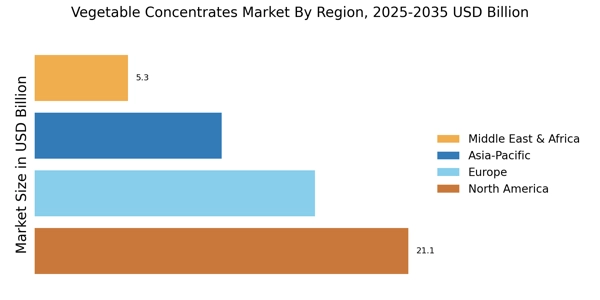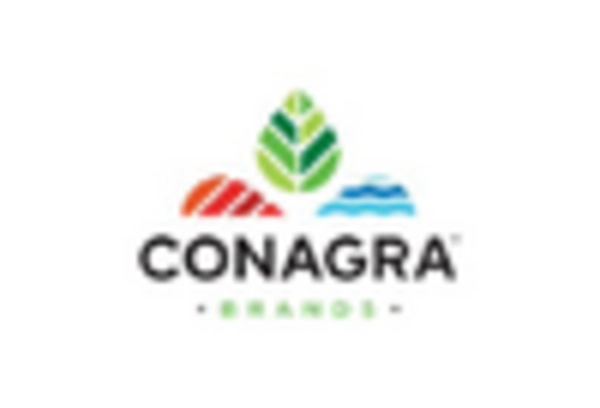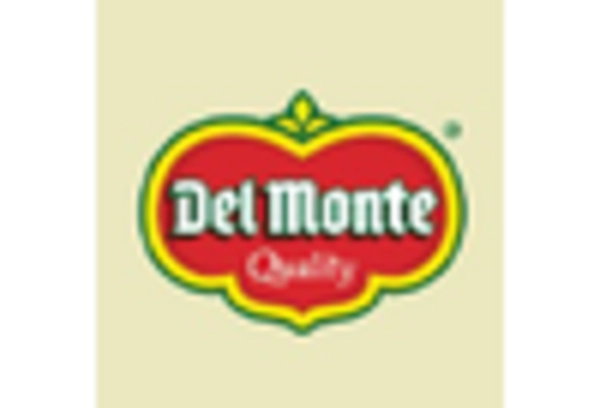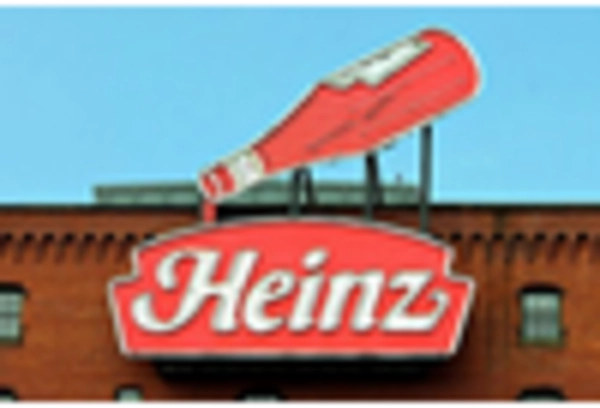Health Conscious Consumer Trends
The Vegetable Concentrates Market is experiencing a notable shift as consumers increasingly prioritize health and wellness. This trend is driven by a growing awareness of the nutritional benefits associated with vegetable concentrates, which are often rich in vitamins, minerals, and antioxidants. As consumers seek convenient yet healthy food options, the demand for vegetable concentrates is projected to rise. Recent data indicates that the market for vegetable concentrates is expected to grow at a compound annual growth rate (CAGR) of approximately 6% over the next five years. This growth is likely fueled by the rising popularity of plant-based diets and the increasing incorporation of vegetable concentrates in various food products, including soups, sauces, and snacks.
Rising Demand for Convenience Foods
The increasing demand for convenience foods is significantly influencing the Vegetable Concentrates Market. As lifestyles become busier, consumers are seeking quick and easy meal solutions that do not compromise on nutrition. Vegetable concentrates serve as a versatile ingredient in ready-to-eat meals, sauces, and snacks, making them an attractive option for manufacturers. Recent market data indicates that the convenience food segment is projected to grow substantially, with vegetable concentrates playing a vital role in this expansion. This trend is likely to continue as more consumers prioritize convenience without sacrificing health, thereby driving the demand for vegetable concentrates in various food applications.
Technological Innovations in Processing
Technological advancements are playing a crucial role in shaping the Vegetable Concentrates Market. Innovations in processing techniques, such as high-pressure processing and freeze-drying, are enhancing the quality and shelf-life of vegetable concentrates. These technologies allow for the preservation of nutrients and flavors, making vegetable concentrates more appealing to consumers. Furthermore, the integration of automation and smart technologies in production processes is streamlining operations and reducing costs. As a result, manufacturers are better positioned to meet the growing demand for high-quality vegetable concentrates. Market analysis suggests that companies investing in advanced processing technologies are likely to gain a competitive edge, as they can offer superior products that cater to health-conscious consumers.
Sustainability and Environmental Concerns
Sustainability has emerged as a pivotal driver within the Vegetable Concentrates Market. Consumers are increasingly inclined towards products that are environmentally friendly and sustainably sourced. This shift is prompting manufacturers to adopt sustainable practices in the production of vegetable concentrates, such as utilizing organic farming methods and reducing carbon footprints. The market is witnessing a surge in demand for clean-label products, which are perceived as healthier and more environmentally responsible. According to recent statistics, the organic vegetable concentrate segment is anticipated to witness a significant increase in market share, reflecting consumers' preferences for sustainable options. This trend not only aligns with consumer values but also enhances brand loyalty and market competitiveness.
Expansion of Food and Beverage Applications
The Vegetable Concentrates Market is witnessing an expansion in its applications across the food and beverage sector. As culinary trends evolve, manufacturers are increasingly incorporating vegetable concentrates into a diverse range of products, including beverages, dressings, and frozen foods. This diversification is driven by the growing consumer preference for flavorful and nutritious options. Recent reports suggest that the beverage segment, particularly smoothies and health drinks, is experiencing a surge in demand for vegetable concentrates, which enhance both taste and nutritional value. This trend indicates a promising future for the vegetable concentrates market, as it continues to adapt to the changing preferences of consumers seeking innovative and health-oriented food solutions.


















